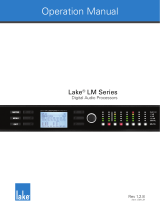Page is loading ...

Whether bringing out the subtleties in all aspects of recording,
mastering, postproduction, and live performance, or lending
character to audio broadcasts, the Dolby
®
740 Spectral Processor
provides a high level of flexibility in audio processing. Based on
the versatile filtering characteristics of Dolby SR noise reduction,
this two-channel dynamic processor allows boosting of low-level
signals while leaving high-level signals untouched. Like a
magnifying glass for sonic details, the Spectral Processor allows
you to tailor your sound like never before.
The Dolby 740 processes low-level signals in a side chain, where
as much as 20 dB of boost can be added in low-, mid-, and high-
frequency bands. The side chain’s signal is then added to the
original input signal, resulting in an output with the low-level
details boosted, while the high-level signals remain unaffected.
For maximum effectiveness, the threshold below which the
processing occurs, the amount of boost in each band, and
the crossovers between bands are all user-adjustable. A gentle
sliding-band noise reduction circuit providing up to 12 dB of
action is also included, to reduce any source noise that the
low-level equalization process might have emphasized. Other
controls include a stereo link switch and adjustable output level.
The user adjustments described above make it possible to
emphasize ambience, lift harmonics, and bring out otherwise
inaccessible details—all without compressing or limiting
transients, increasing overall level, or disturbing the overall
sense of dynamics.
User adjustments for selectively boosting low-level signals allow
broadcasters to tailor the sound for their station, whatever the
format. It conveys all the detail of the original source material
while eliminating the over-processed sound that can fatigue
listeners. When used in conjunction with a conventional
compressor/limiter, the Spectral Processor adds greater
punch, presence, clarity, and loudness to broadcast signals.
The Dolby 740 is a two-channel, dynamics-based processor for emphasizing low-level
sonic details in audio programming.
740
Spectral Processor

Front-Panel Controls and Indicators
Individual for each channel
Threshold:
Sets level at which signals receive most boost;
adjustable from 60 to 40 dB below the nominal
operating level; five-LED meter array indicates
when processor is most active; input clip LED
Equalization:
Three-band filter section
Low-to-Mid crossover frequency adjustable from
75 Hz to 1 kHz, center detent at 300 Hz
Mid-to-High crossover frequency adjustable from
500 Hz to 8 kHz, center detent at 2 kHz
Boost controls for each band; greater than 20 dB
with crossover controls set to their detent positions
Three-position EQ switch selects one
of the following modes: In—processing active; main
path and side chain added within the unit; Side
Chain—side chain signal only, to ease adjustment
of the EQ controls or allow external manipulation;
Out—all processing bypassed (including Source NR)
Source NR:
Sliding band noise reduction section
reduces noise present in the input signal;
adjustable 0–12 dB
Filters:
Selectable; prevent unwanted signals from
entering the low-level processing stage
Highpass: 100, 200 Hz
Lowpass: 4, 8 kHz
Output:
Sets overall channel gain; adjustable from –14 to
+6 dB (with processing out). Clip LED will light to
indicate clipping in the output stage.
Stereo Link:
Switch combines dynamic processor control
signals to prevent image-shifting with stereo
signals; EQ Crossover and Boost controls remain
independent even when processors are linked
Operating Levels
Switch on rear of unit selects between High
(+4 dBu) and Low (–6 dBu) line-level operation
Inputs
XLR type connectors, balanced, floating;
impedance: 10 kΩ. Maximum Level: High:
+24 dBu; Low: +14 dBu
Outputs
XLR type connectors, balanced, floating;
impedance: 20Ω. Maximum Level: +26 dBu
balanced, +21 dBu unbalanced (irrespective of the
position of the High/Low switch); either leg of the
output may be grounded for unbalanced operation
with no loss of level
Power Requirements
User-selected voltage nominally 100,
120, 220, 240 VAC 36 W approximate
Dimensions and Weight
1-U rackmount: 44 × 483 × 248 mm
(1.75 × 19 × 9.76 inches); further 65 mm
(2.5 inches) depth required for the
XLR connectors
Net: 5.3 kg (11.6 lb) approximate
Environmental Conditions
0° to 40°C (32° to 104°F)
Warranty
One-year limited, parts and labor; see disclaimer.
Specifications subject to change without notice.
Dolby 740 Spectral Processor
Disclaimer of Warranties
Equipment manufactured by Dolby Laboratories is warranted against
defects in materials and workmanship for a period of one year from the
date of purchase. There are no other express or implied warranties and
no warranty of merchantability or fitness for a particular purpose, or of
noninfringement of third-party rights (including, but not limited to,
copyright and patent rights).
Limitation of Liability
It is understood and agreed that Dolby Laboratories’ liability whether
in contract, in tort, under any warranty, in negligence, or otherwise
shall not exceed the cost of repair or replacement of the defective
components or accused infringing devices, and under no circumstances
shall Dolby Laboratories be liable for incidental, special, direct, indirect,
or consequential damages (including, but not limited to, damage to
software or recorded audio or visual material), cost of defense, or loss of
use, revenue, or profit even if Dolby Laboratories or its agents have been
advised, orally or in writing, of the possibility of such damages.
Dolby and the double-D symbol are trademarks of Dolby Laboratories.
© 2004 Dolby Laboratories, Inc. All rights reserved. S04/13656/15267
Part No. 91313 Issue 6
Dolby Laboratories, Inc. 100 Potrero Avenue, San Francisco, CA 94103-4813 Telephone 415-558-0200 Fax 415-863-1373
Wootton Bassett, Wiltshire SN4 8QJ, England Telephone (44) 1793-842100 Fax (44) 1793-842101 www.dolby.com
/






